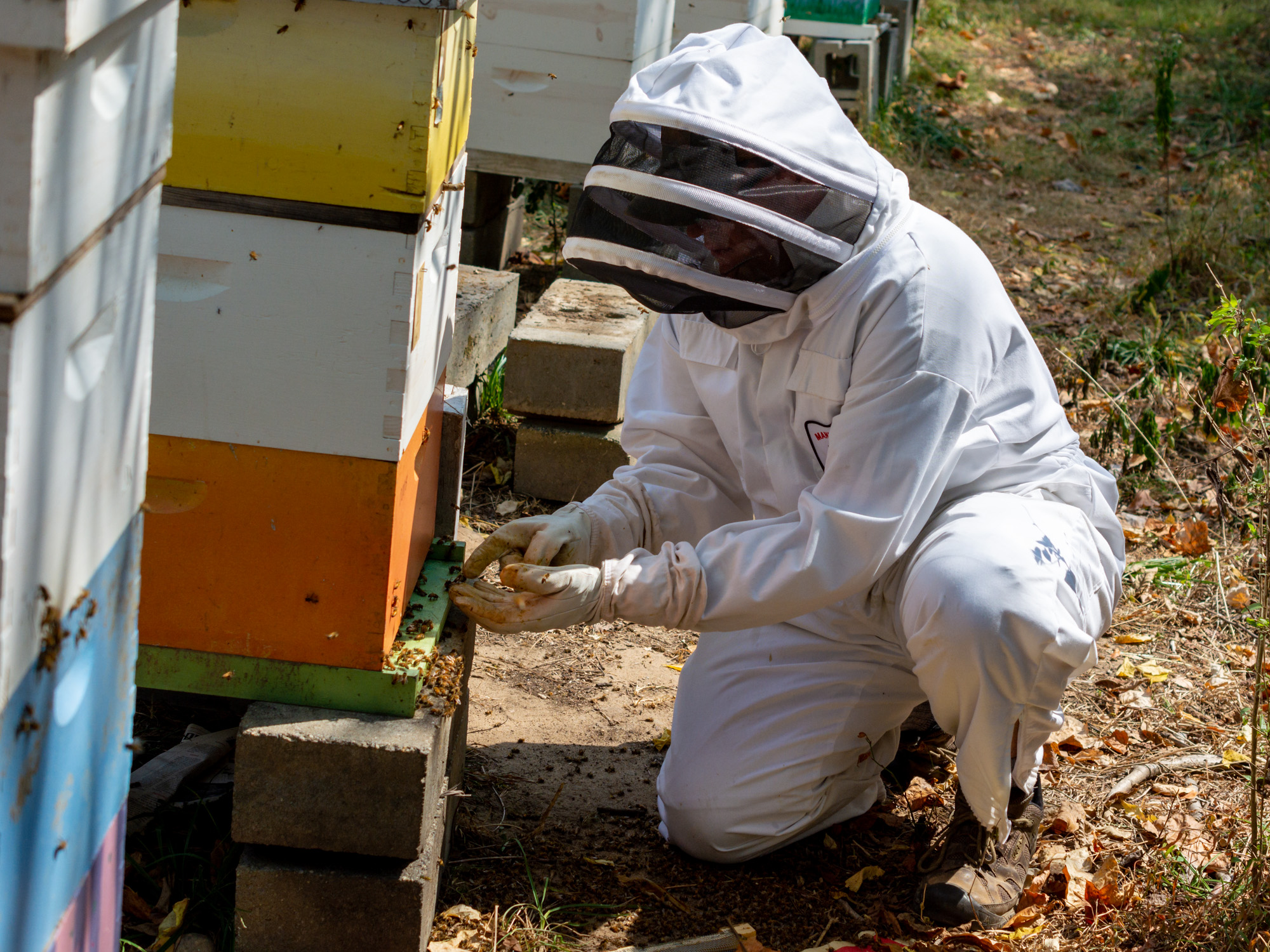Inside one of many beehives in a narrow, sloped patch of forest just south of the Xfinity Center on Saturday, there was a battle in progress. Some members of the hive were dissatisfied with their current queen, so they staged a coup to oust her.
That’s when members of the University of Maryland’s beekeeping club sprung into action, cutting off the queen cells to halt the overflow in its tracks. Another day, and it would have been too late.
“We were out here in the middle of the day having a beekeeping emergency,” said Christine Johnson, a sophomore environmental science major.
The beekeeping club’s membership has gradually increased over the last few years. The club manages to keep up a cohort of 25 to 30 active members and another 200 or so “semi-active members,” in its GroupMe said Ian Howard, a plant science graduate student and the club’s operational adviser. Many people join after being enticed by honey cookies but stay for the bees — which, members say, are far more fascinating than most give them credit for.
And interest in the buzzing creatures spiked even more after the club found itself near the center of a demonstration by a religious group on McKeldin Mall two weeks ago, Howard said.
[Read more: Armed with drums, pride flags and signs, hundreds drown out sexist demonstrators at UMD]
A post on this university’s subreddit from that day captures the confusion. It’s a photo of the chaos clearly playing out on the mall: Hundreds of students are gathered around the demonstrators, and a sign reading “JESUS OR HELLFIRE” is visible in the middle of the crowd.
But tucked away in the photo’s foreground — mostly obscured by the masses — is the beekeeping club’s table, clad in bright yellow cloth.
“What’s happening?” one Reddit user wrote.
“I think they’re selling cookies and other baked treats,” another responded.
“Purchased some soap and honey, can confirm, quality products,” a third said.
Howard, a plant science graduate student, credited greater student awareness of the club to its proximity to the protest, but lamented being associated with the slur-hurling protesters, who called students “sinners” and verbally attacked women, Muslims and LGBT people. The club was glad to be “able to bring some positivity to that very not-positive event,” he said.
And with the hundreds of student counterprotesters who came to fight the religious group, the club sold all the goods it had brought.
The bees get less active as the temperatures drop, Meoni said. During the winter, the club holds workshops where members makes wax goods like soap and candles for bake sales. They hope to eventually hold a bake sale every month, but they’re currently out of honey, club leaders said, after completing selling out over four days — 34 pounds overall.
Josh Smith, a freshman computer science major who was at last week’s beekeeping club meeting, said he learned about the group from a Reddit post following the protests. He was bored, and it piqued his interest. He also likes honey — he was sold on the club.
[Read more: Honeybees are dying. In three minutes, a UMD student can tell you why]
There is a lot to be sold on, but keeping bees is tough, members said. All of the club’s bees died during a particularly cold winter in 2017, forcing the group to start from scratch with new bees. The club also couldn’t harvest any honey the first year because the new bees needed it to build a hive.
But even with cooperative weather, there’s plenty of drama in the bee world. The bees can upend their hives with internal power struggles.
“Bee politics are more complicated than you’d think it would be,” said Olivia Meoni, a sophomore anthropology major.
When a new queen is needed, Meoni said, there are always multiple queen cells. But there can only be one monarch to rule the hive. Oftentimes, the queen who emerges first will kill her rivals while they’re still in their cells.
“It’s like a Game of Thrones battle to the death,” she said.
Meetings, however, aren’t always about settling coups. At a typical meeting, the beekeepers check on the half-million bees and their hives, which have creative names like “Bumbledore” and “Bethiopia,” and tend to any irregularities they see. Some members take inventory of the club’s belongings, which include fancy “flow hives” that make extracting honey much easier. Others work on a trough that diverts water that would otherwise run down the hill and flood the club’s two sheds.
Recently, though, the hive faced a crisis. Howard was checking on some dead bees when he noticed a particularly large one crawling on the ground. It was the queen.
She’d left the hive for unknown reasons. Howard donned his beekeeping suit, hustled over and gently ushered the queen onto his finger. It was an unusual event, he said, as queen bees almost never leave the hive except to get mated.
“The workers just sort of corralled her up,” once she returned, he said, “like a security escort.” They poked her and smelled her to check that she was indeed their queen before returning to their business.
With the queen safe and sound, the hive was saved.
“It seems like it’s just a box full of insects,” Howard said. “But it’s a lot more than that.”



